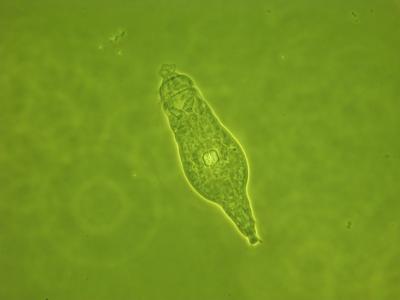
Photo: Bdelloid rotifers (A. vaga) under the microscope.
view more
Credit Image: E.A. Mnatsakanova and O.A. Vakhrusheva/Skoltech
Skoltech’s evolutionary biologists discovered recombination in bdelloid rotifers, microscopic freshwater invertebrates, which have long been regarded as ‘an evolutionary scandal’ due to their presumed ancient asexuality. The existence of such anciently asexual groups calls into question the hypothesis that sexual reproduction is indispensable for long-term evolutionary success of species. However, the recent study published in Nature Communications provides evidence of recombination and genetic exchange in bdelloids.
Sexual reproduction which involves recombination and exchange of genetic material between individuals of the same species is thought to be essential for the long-term survival of species. Although transitions to asexual reproduction are quite frequent in eukaryotes, they typically result in rapid extinction. On these grounds, transition to asexual reproduction is usually regarded as an evolutionary dead end. However, there are a few notable exceptions to this rule, such as bdelloid rotifers which were long assumed to have switched to asexual reproduction several tens of millions of years ago.
An international team of scientists led by Georgii Bazykin, a professor at the Skoltech Center for Life Sciences (CLS), and Alexey Kondrashov, a professor at Moscow State University (MSU), obtained whole-genome sequencing data for several individuals of Adineta vaga and found evidence suggesting recombination in this bdelloid species.
The scientists analyzed whole genomes of 11 A. vaga individuals revealing signatures of recombination and interindividual genetic exchange.
“We have shown that variation within the population of A. vaga is inconsistent with strict clonality and lack of recombination. Bdelloid rotifers are frequently referred to as ‘an evolutionary scandal’. However, our results suggest that the status of bdelloid rotifers as an ancient asexual group should probably be reconsidered. Our findings underscore the importance of recombination for the long-term evolutionary success of species. Although some data hint at the existence of meiosis in bdelloid rotifers, mechanisms of genetic exchange in this group of species remain obscure and are subject to further research,” comments Olga Vakhrusheva, the lead author and a junior research scientist at Skoltech.
###
TDnews (tunisiesoir.com)














